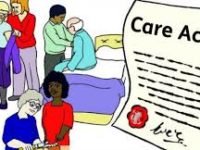 Cheryl Holdship began her talk by explaining that she started her career as a Social Worker, working for a local authority. As a consequence of an accident to her husband she had to become a carer for him and then became an independent Social Worker. She found working for a local authority very unsatisfying because she often had to pull back from clients who still needed her support whereas now she’s independent and funded by her clients she can be committed to their care needs.
Cheryl Holdship began her talk by explaining that she started her career as a Social Worker, working for a local authority. As a consequence of an accident to her husband she had to become a carer for him and then became an independent Social Worker. She found working for a local authority very unsatisfying because she often had to pull back from clients who still needed her support whereas now she’s independent and funded by her clients she can be committed to their care needs.
She proceeded to outline two case studies but changing names and some of the details to preserve anonymity.
Case Study One was Anna who had Parkinson’s disease, living at home and receiving 24 hour care. Her care was funded by the NHS Continuing Health Care budget. At one point she went into hospital and when she was back at home she needed two full-time carers. Eventually she went into a care home as part of a relocation so she could be closer to her family. Cheryl took on the role of monitoring the care provision by visiting the home every two weeks. This meant that when the family visited they could dedicate their time to their mother and didn’t have to worry about the management of the care she was receiving. Cheryl referred to this as “Monitoring Support”.
Case Study Two was Jane and Paul where Paul had a stroke and was initially cared for in hospital. On being discharged his care was paid for by the NHS Continuing Health Care but this was withdrawn. It seems the NHS in their efforts to control their budgets are cutting back on Continuing Health Care funding and the administrators are making decisions based on cost rather than need. Cheryl’s role in this instance was to assist Jane to put together an appeal and to prepare her for the appeals process. Jane won the case and all funding was restored. Cheryl referred to this as Task Support where here involvement was concluded once the appeal had been successful.
 Cheryl explained that the definition of “Continuing Health Care” is unclear with the courts having defined it in one way and the NHS National Framework describing it differently.
Cheryl explained that the definition of “Continuing Health Care” is unclear with the courts having defined it in one way and the NHS National Framework describing it differently.
 There followed a question and answer session that clearly indicated this is a complicated area, particularly if someone is self-funded and needs to procure the right care package for themselves or a loved one. There is a legal obligation on Local Authorities to undertake an assessment of all people requiring support however the first part is a financial assessment. If someone has assets of over £23,250 (which include their house if they are a homeowner) then some Local Authorities will charge for the assessment.
There followed a question and answer session that clearly indicated this is a complicated area, particularly if someone is self-funded and needs to procure the right care package for themselves or a loved one. There is a legal obligation on Local Authorities to undertake an assessment of all people requiring support however the first part is a financial assessment. If someone has assets of over £23,250 (which include their house if they are a homeowner) then some Local Authorities will charge for the assessment.
The difficulty of finding carers for home care in a rural location can be especially difficult because some care agencies do not pay their staff for the travel time between clients. Cheryl pointed out this practice was reducing because most carers will not work in this way.
Several questions regarded paying for care homes which varied in price from £450 to over £1,000 per week and the cost alone wasn’t a guarantee that the more you paid the better care you received.
It was a lot of information to take in and at the end of the talk the only clear thing about Adult Social Care is that it is a minefield for those of us who have to navigate it on behalf of our loved ones.

Leave a Reply
You must be logged in to post a comment.